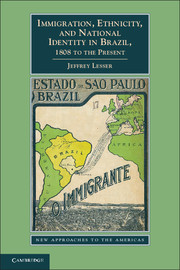Book contents
- Frontmatter
- Contents
- List of Figures, Tables, and Documents
- Acknowledgments
- Chapter 1 Creating Brazilians
- Chapter 2 From Central Europe and Asia
- Chapter 3 Mass Migrations, 1880–1920
- Chapter 4 The Creation of Euro-Brazilian Identities
- Chapter 5 How Arabs Became Jews, 1880–1940
- Chapter 6 Asianizing Brazil
- Epilogue
- Historiographical Essay
- Index
- References
Chapter 5 - How Arabs Became Jews, 1880–1940
Published online by Cambridge University Press: 05 February 2013
- Frontmatter
- Contents
- List of Figures, Tables, and Documents
- Acknowledgments
- Chapter 1 Creating Brazilians
- Chapter 2 From Central Europe and Asia
- Chapter 3 Mass Migrations, 1880–1920
- Chapter 4 The Creation of Euro-Brazilian Identities
- Chapter 5 How Arabs Became Jews, 1880–1940
- Chapter 6 Asianizing Brazil
- Epilogue
- Historiographical Essay
- Index
- References
Summary
JUDEU: “a knowledgeable and ambitious businessman: an exploiter”
JUDIA: “a very white and pink-cheeked (i.e., does not become dark in the sun) woman, but without charm” (see dei nition for Alemoa, Chapter 2 )
TURCO:“the same as Jew, with respect to business”
From Felisbelo da Silva (Police Investigator), Dicionário de Gíria [Dictionary of slang] (São Paulo: Editora Prelúdio, 1974), 69, 107.Unexpected Immigrants
The previous chapter told one kind of immigrant story. Southern European Catholics, so desired from afar, became increasingly problematic for elites once they began to settle in Brazil. Politicians and the landowners they supported expected Italian, Spanish, and Portuguese immigrants to lead an easy transition from slave to wage labor and from a largely African-descended population to a Europeanized one. The immigrants, however, did not fulfill all those expectations. They were no more likely than slaves to be productive on plantations when poorly treated. Their ambitions for personal and communal success were often at odds with the exploitative labor conditions created by the planters who encouraged and often sponsored their entry. Tensions between immigrants and natives often exploded into violence. By the late 1920s, elite concerns about immigrant-led labor agitation were strong. A common characterization of the government approach was the phrase, often misattributed to President Washington Luís Pereira de Sousa (1926–1930), that the “the social question [i.e., the labor movement] is a matter for the police.”
- Type
- Chapter
- Information
- Publisher: Cambridge University PressPrint publication year: 2013



